Award Winners

Longlisted: The VCU-Cabell First Novelist Award
WINNER, 2023 BEST INDIE BOOK AWARD, LGBTQ2 FICTION
LONG LIST, VCU CABELL FIRST NOVELIST AWARD
ON LAMBDA LITERARY REVIEW'S SEPTEMBER MOST ANTICIPATED LIST
ONE OF QUEER FORTY'S BEST PRIDE READS FOR SUMMER 2023!
Three gay men in pre-Stonewall New York City find their fates thrown together in the police raid of a Village bar.
Roger Moorhouse is a Wall Street banker and Westchester family man with a preciously guarded secret. As the shouting begins and flashlights blaze in his face, the life he’s carefully curated over the years—a fancy new office overlooking lower Broadway, a house in Beechmont Woods, his wife and children—is about to come crashing down around him.
Columbia literature professor Julian Prince lives a comparatively uncloseted life when he finds his first committed relationship tested to its limits. How could he explain to Gus, a fearless young artist, that he couldn’t stay with him that weekend because the woman who was still technically Julian’s fiancée would be visiting? But when Gus is struck unconscious by a police baton, Julian comes out of hiding to protect him, even if exposure means losing everything.
For Danny Duffy, an Irish kid from the Bronx with a sassy mouth and a diverse group of friends, the raid is a galvanizing, Spartacus moment. Danny doesn’t have too much left to lose; his family has just disowned him. But once his name appears in the newspaper, he’ll be fired from his job at Sloan’s Supermarket, where he’s risen to assistant manager of produce, and begin a journey that veers between political enlightenment and violent revenge.
The three men find themselves in a police wagon together, their hidden lives threatened to be revealed to the world. Blackmail, a private investigator, Gus’s disappearance, and Danny’s quest for retribution propel Disorderly Men to its piercing conclusion, as each man meets the boundaries of his own fear, love, and shame. The stakes for each are different, but all of them confront a fundamental question: How much happiness is he allowed to have . . . and what share of it will he lay claim to?
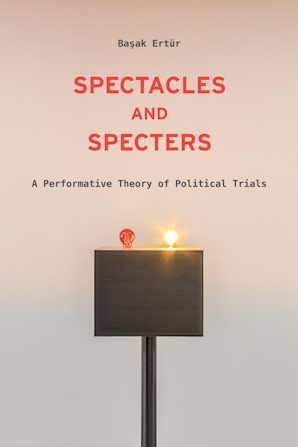
Winner: SLSA Socio-Legal Theory and History Prize
WINNER, SLSA SOCIO-LEGAL THEORY AND HISTORY PRIZE
SHORTLISTED, THE HART-SLSA BOOK PRIZE
Spectacles and Specters draws on theories of performativity to conceptualize the entanglements of law and political violence, offering a radical departure from accounts that consider political trials as instrumental in exercising or containing political violence. Legal scholar Başak Ertür argues instead that making sense of the often incalculable interpenetrations of law, politics, and violence in trials requires shifting the focus away from law's instrumentality to its performativity.
Ertür develops a theory of political trials by reconstructing and building on a legacy of critical thought on Nuremberg in close engagement with theories of performativity. She then offers original case studies that introduce a new perspective by looking beyond the Holocaust trials, to the Armenian genocide and its fragmentary legal aftermaths. These cases include the 1921 trial of Soghomon Tehlirian, the 2007-21 Hrant Dink Murder Trial, and the 2015 case before the European Court of Human Rights concerning the denial of the Armenian genocide.
Enabling us to capture the various modalities in which the political emerges in, through and in relation to legal forms on the stage of the trial, this focus on law's performativity also allows us to account for how sovereign schemes can misfire and how trials can come to have unintended political lives and afterlives. Further, it reveals how law is entangled with and perpetuates certain histories of violence, rather than simply ever mastering these histories or providing closure.
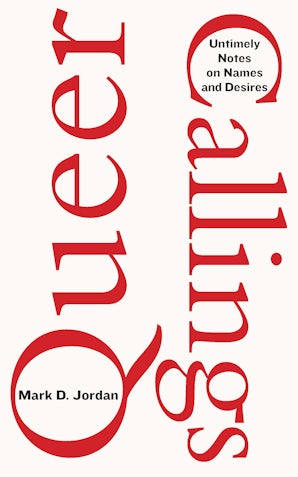
Shortlisted: Publishing Triangle Awards: The Randy Shilts Award for Gay Nonfiction
FINALIST, THE RANDY SHILTS AWARD FOR GAY NONFICTION, THE PUBLISHING TRIANGLE AWARDS
A passionate exhortation to expand the ways we talk about human sex, sexuality, and gender.
Twenty-five years ago, Mark D. Jordan published his landmark book on the invention and early history of the category “sodomy,” one that helped to decriminalize certain sexual acts in the United States and to remove the word sodomy from the updated version of a standard English translation of the Christian Bible. In Queer Callings, Jordan extends the same kind of illuminating critical analysis to present uses of “identity” with regard to sexual difference. While the stakes might not seem as high, he acknowledges, his newest history of sexuality is just as vital to a better present and future.
Shaking up current conversations that focus on “identity language,” this essential new book seeks to restore queer languages of desire by inviting readers to consider how understandings of “sexual identity” have shifted—and continue to shift—over time. Queer Callings re-reads texts in various genres—literary and political, religious and autobiographical—that have been preoccupied with naming sex/gender diversity beyond a scheme of LGBTQ+ identities. Engaging a wide range of literary and critical works concerned with sex/gender self-understanding in relation to “spirituality,” Jordan takes up the writings of Oscar Wilde, Marcel Proust, Djuna Barnes, Samuel R. Delany, Audre Lorde, Geoff Mains, Eve Kosofsky Sedgwick, Gloria Anzaldúa, Maggie Nelson, and others.
Before it’s possible to perceive sexual identities differently, Jordan argues, current habits for classifying them have to be disrupted. In this way, Queer Callings asks us to reach beyond identity language and invites us to re-perform a selection of alternate languages—some from before the invention of phrases like “sexual identity,” others more recent. Tracing a partial genealogy for “sexual identity” and allied phrases, Jordan reveals that the terms are newer than we might imagine. Many queer folk now counted as literary or political ancestors didn’t claim a sexual or gender identity: They didn’t know they were supposed to have one. Finally, Queer Callings joins the writers it has evoked to resist any remaining confidence that it’s possible to give neatly contained accounts of human desire. Reaching into the past to open our eyes to extraordinary opportunities in our present and future, Queer Callings is a generatively destabilizing and essential read.
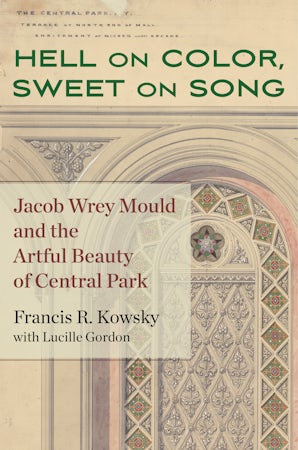
Winner: Victorian Society in America Book Award
WINNER, VICTORIAN SOCIETY IN AMERICA BOOK AWARD
WINNER, 2024 PUBLICATION PRIZE, FRIENDS OF THE UPPER EAST SIDE HISTORIC DISTRICTS
Reveals new and previously unknown biographical material about an important figure in nineteenth-century American architecture and music.
Jacob Wrey Mould is not a name that readily comes to mind when we think of New York City architecture. Yet he was one-third of the party responsible for the early development of the city’s Central Park. To this day, his sculptural reliefs, tile work, and structures in the Park enthrall visitors. Mould introduced High Victorian architecture to NYC, his fingerprint most pronounced in his striking and colorful ornamental designs and beautiful embellishments found in the carved decorations and mosaics at the Bethesda Terrace. Resurfacing the forgotten contributions of Mould, Hell on Color, Sweet on Song presents a study of this nineteenth-century American architect and musical genius.
Jacob Wrey Mould, whose personal history included a tie to Africa, was born in London in 1825 and trained there as an architect before moving to New York in 1852. The following year, he received the commission to design All Souls Unitarian Church. Nicknamed “the Church of the Holy Zebra,” it was the first building in America to display the mix of colorful materials and medieval Italian inspiration that was characteristic of High Victorian Gothic architecture. In addition to being an architect and designer, Mould was an accomplished musician and prolific translator of opera librettos. Yet anxiety over money and resentment over lack of appreciation of his talents soured Mould’s spirit. Unsystematic, impractical, and immune from maturity, he displayed a singular indifference to the realities of architecture as a commercial enterprise. Despite his personal shortcomings, he influenced the design of some of NYC’s revered landmarks, including Sheepfold, the Metropolitan Museum of Art, the American Museum of Natural History, the City Hall Park fountain, and the Morningside Park promenade. From 1875 to 1879, he worked for Henry Meiggs, the “Yankee Pizarro,” in Lima, Peru.
Resting on the foundation of Central Park docent Lucille Gordon’s heroic efforts to raise from obscurity one of the geniuses of American architecture and a significant contributor to the world of music in his time, Hell on Color, Sweet on Song sheds new light on a forgotten genius of American architecture and music.
Funding for this book was provided by: Furthermore: a program of the J. M. Kaplan Fund

Shortlisted: The Hart–SLSA Book Prize
WINNER, SLSA SOCIO-LEGAL THEORY AND HISTORY PRIZE
SHORTLISTED, THE HART-SLSA BOOK PRIZE
Spectacles and Specters draws on theories of performativity to conceptualize the entanglements of law and political violence, offering a radical departure from accounts that consider political trials as instrumental in exercising or containing political violence. Legal scholar Başak Ertür argues instead that making sense of the often incalculable interpenetrations of law, politics, and violence in trials requires shifting the focus away from law's instrumentality to its performativity.
Ertür develops a theory of political trials by reconstructing and building on a legacy of critical thought on Nuremberg in close engagement with theories of performativity. She then offers original case studies that introduce a new perspective by looking beyond the Holocaust trials, to the Armenian genocide and its fragmentary legal aftermaths. These cases include the 1921 trial of Soghomon Tehlirian, the 2007-21 Hrant Dink Murder Trial, and the 2015 case before the European Court of Human Rights concerning the denial of the Armenian genocide.
Enabling us to capture the various modalities in which the political emerges in, through and in relation to legal forms on the stage of the trial, this focus on law's performativity also allows us to account for how sovereign schemes can misfire and how trials can come to have unintended political lives and afterlives. Further, it reveals how law is entangled with and perpetuates certain histories of violence, rather than simply ever mastering these histories or providing closure.

Winner: FRIENDS of the Upper East Side Historic Districts Publiciation Award
WINNER, VICTORIAN SOCIETY IN AMERICA BOOK AWARD
WINNER, 2024 PUBLICATION PRIZE, FRIENDS OF THE UPPER EAST SIDE HISTORIC DISTRICTS
Reveals new and previously unknown biographical material about an important figure in nineteenth-century American architecture and music.
Jacob Wrey Mould is not a name that readily comes to mind when we think of New York City architecture. Yet he was one-third of the party responsible for the early development of the city’s Central Park. To this day, his sculptural reliefs, tile work, and structures in the Park enthrall visitors. Mould introduced High Victorian architecture to NYC, his fingerprint most pronounced in his striking and colorful ornamental designs and beautiful embellishments found in the carved decorations and mosaics at the Bethesda Terrace. Resurfacing the forgotten contributions of Mould, Hell on Color, Sweet on Song presents a study of this nineteenth-century American architect and musical genius.
Jacob Wrey Mould, whose personal history included a tie to Africa, was born in London in 1825 and trained there as an architect before moving to New York in 1852. The following year, he received the commission to design All Souls Unitarian Church. Nicknamed “the Church of the Holy Zebra,” it was the first building in America to display the mix of colorful materials and medieval Italian inspiration that was characteristic of High Victorian Gothic architecture. In addition to being an architect and designer, Mould was an accomplished musician and prolific translator of opera librettos. Yet anxiety over money and resentment over lack of appreciation of his talents soured Mould’s spirit. Unsystematic, impractical, and immune from maturity, he displayed a singular indifference to the realities of architecture as a commercial enterprise. Despite his personal shortcomings, he influenced the design of some of NYC’s revered landmarks, including Sheepfold, the Metropolitan Museum of Art, the American Museum of Natural History, the City Hall Park fountain, and the Morningside Park promenade. From 1875 to 1879, he worked for Henry Meiggs, the “Yankee Pizarro,” in Lima, Peru.
Resting on the foundation of Central Park docent Lucille Gordon’s heroic efforts to raise from obscurity one of the geniuses of American architecture and a significant contributor to the world of music in his time, Hell on Color, Sweet on Song sheds new light on a forgotten genius of American architecture and music.
Funding for this book was provided by: Furthermore: a program of the J. M. Kaplan Fund
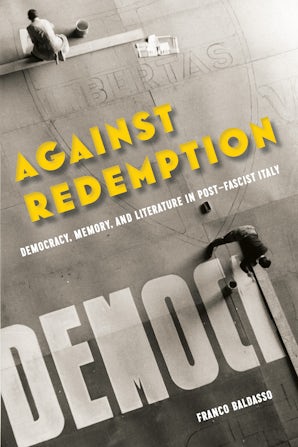
Winner: AHA Helen & Howard R. Marraro Prize
WINNER, HELEN AND HOWARD R. MARRARO PRIZE IN ITALIAN HISTORY
Discloses the richness of ideas and sheds light on the controversy that characterized the transition from fascism to democracy, examining authors, works and memories that were subsequently silenced by Cold War politics.
How a shared memory of Fascism and its cultural heritage took shape is still today the most disputed question of modern Italy, crossing the boundaries between academic and public discourse. Against Redemption concentrates on the historical period in which disagreement was at its highest: the transition between the downfall of Mussolini in July 1943 and the victory of the Christian Democrats over the Left in the 1948 general elections. By dispelling the silence around the range of opinion in the years before the ideological struggle fossilized into Cold War oppositions, this book points to early postwar literary practices as the main vehicle for intellectual dissent, shedding new light on the role of cultural policies in institutionalizing collective memory.
During Italy’s transition to democracy, competing narratives over the recent traumatic past emerged and crystallized, depicting the country’s break with Mussolini’s regime as a political and personal redemption from its politics of exclusion and unrestrained use of violence. Conversely, outstanding authors such as Elsa Morante, Carlo Levi, Alberto Moravia, and Curzio Malaparte, in close dialogue with remarkable but now-neglected figures, stressed the cultural continuity between the new democracy and Fascism, igniting heated debates from opposite political standpoints. Their works addressed questions such as the working through of national defeat, Italian responsibility in World War II, and the Holocaust, revealing how the social, racial, and gender biases that characterized Fascism survived after its demise and haunted the newborn democracy.

Winner: 2023 Best Indie Book Awards, LGBTQ2 Fiction
WINNER, 2023 BEST INDIE BOOK AWARD, LGBTQ2 FICTION
LONG LIST, VCU CABELL FIRST NOVELIST AWARD
ON LAMBDA LITERARY REVIEW'S SEPTEMBER MOST ANTICIPATED LIST
ONE OF QUEER FORTY'S BEST PRIDE READS FOR SUMMER 2023!
Three gay men in pre-Stonewall New York City find their fates thrown together in the police raid of a Village bar.
Roger Moorhouse is a Wall Street banker and Westchester family man with a preciously guarded secret. As the shouting begins and flashlights blaze in his face, the life he’s carefully curated over the years—a fancy new office overlooking lower Broadway, a house in Beechmont Woods, his wife and children—is about to come crashing down around him.
Columbia literature professor Julian Prince lives a comparatively uncloseted life when he finds his first committed relationship tested to its limits. How could he explain to Gus, a fearless young artist, that he couldn’t stay with him that weekend because the woman who was still technically Julian’s fiancée would be visiting? But when Gus is struck unconscious by a police baton, Julian comes out of hiding to protect him, even if exposure means losing everything.
For Danny Duffy, an Irish kid from the Bronx with a sassy mouth and a diverse group of friends, the raid is a galvanizing, Spartacus moment. Danny doesn’t have too much left to lose; his family has just disowned him. But once his name appears in the newspaper, he’ll be fired from his job at Sloan’s Supermarket, where he’s risen to assistant manager of produce, and begin a journey that veers between political enlightenment and violent revenge.
The three men find themselves in a police wagon together, their hidden lives threatened to be revealed to the world. Blackmail, a private investigator, Gus’s disappearance, and Danny’s quest for retribution propel Disorderly Men to its piercing conclusion, as each man meets the boundaries of his own fear, love, and shame. The stakes for each are different, but all of them confront a fundamental question: How much happiness is he allowed to have . . . and what share of it will he lay claim to?
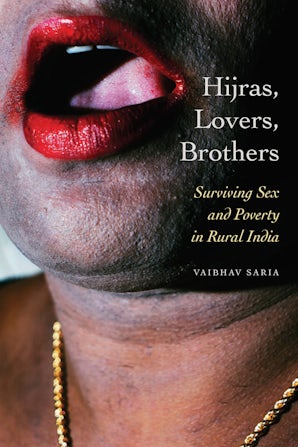
Commended: The Anne Bolin & Gil Herdt Book Prize in Human Sexuality & Anthropology
Winner, 2023 Bernard S. Cohn Prize, Association for Asian Studies
Winner, 2021 Joseph W. Elder Prize in the Indian Social Sciences
Winner, 2021 Ruth Benedict Prize, Association for Queer Anthropology
Honorable Mention, 2023 Anne Bolin & Gil Herdt Book Prize, Human Sexuality & Anthropology Interest Group
Hijras, one of India’s third gendered or trans populations, have been an enduring presence in the South Asian imagination—in myth, in ritual, and in everyday life, often associated in stigmatized forms with begging and sex work. In more recent years hijras have seen a degree of political emergence as a moral presence in Indian electoral politics, and with heightened vulnerability within global health terms as a high-risk population caught within the AIDS epidemic.
Hijras, Lovers, Brothers recounts two years living with a group of hijras in rural India. In this riveting ethnography, Vaibhav Saria reveals not just a group of stigmatized or marginalized others but a way of life composed of laughter, struggles, and desires that trouble how we read queerness, kinship, and the psyche.
Against easy framings of hijras that render them marginalized, Saria shows how hijras makes the normative Indian family possible. The book also shows that particular practices of hijras, such as refusing to use condoms or comply with retroviral regimes, reflect not ignorance, irresponsibility, or illiteracy but rather a specific idiom of erotic asceticism arising in both Hindu and Islamic traditions. This idiom suffuses the densely intertwined registers of erotics, economics, and kinship that inform the everyday lives of hijras and offer a repertoire of self-fashioning beyond the secular horizons of public health or queer theory.
Engrossingly written and full of keen insights, the book moves from the small pleasures of the everyday—laughter, flirting, teasing—to impossible longings, kinship, and economies of property and substance in order to give a fuller account of trans lives and of Indian society today.
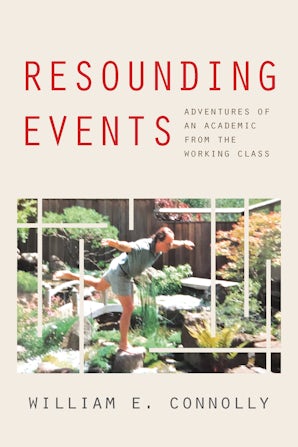
Winner: David Easton Award
Winner, David Easton Award for Political Theory, 2023
In Resounding Events, one of the world’s preeminent political theorists reflects on a career as an academic hailing from the working class. From youthful experiences of McCarthyism, to the resurgence of white evangelicalism, to the advent of aspirational fascism and the acceleration of the Anthropocene, Connolly traces a career spent passionately engaged in making a more just, diverse, and equitable world. He surveys the shifting ground upon which politics can be pursued; and he discloses how to be an intellectual in universities that today do not encourage that practice.
Far more than a memoir, Resounding Events probes the concerns that have animated Connolly’s work across more than a dozen books by tracing the bumpy imbrications of event, memory and thinking in intellectual life. Connolly experiments with ways to capture various voices that mark a self at any time. An event, as he elaborates it, is what disturbs or inspires thinking as it activates layered sheets of memory. A memory sheet itself assembles recollections, dispositions organized from the past, and vague remains that carry efficacies.
Resounding Events shows how resonances between event and memory can help forge new concepts better adjusted to an emergent situation. Addressing tensions between working class experience and norms of the academy, his father’s coma, antiwar protests, the growing disaffection of the white working class, the neoliberalization of the university, climate denialism, and his sister’s experience with workers shifting to Trump, Connolly shows how engaged intellectuals become worthy of the events they encounter.
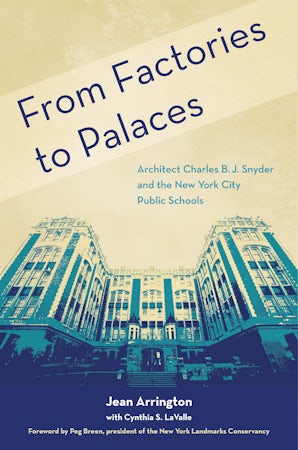
Winner: The Victorian Society New York Book Award
WINNER, THE VICTORIAN SOCIETY NEW YORK, 2022 BOOK AWARD
How a prolific yet little-known architect changed the face of education in New York City
As Superintendent of School Buildings from 1891 to 1922, architect Charles B. J. Snyder elevated the standards of school architecture. Unprecedented immigration and Progressive Era changes in educational philosophy led to his fresh approach to design and architecture, which forever altered the look and feel of twentieth-century classrooms and school buildings. Students rich or poor, immigrant or native New Yorker, went from learning in factory-like schools to attending classes in schools with architectural designs and enhancements that to many made them seem like palaces. Spanning three decades, From Factories to Palaces provides a thought-provoking narrative of Charles Snyder and shows how he integrated his personal experiences and innovative design skills with Progressive Era school reform to improve students’ educational experience in New York City and, by extension, across the nation.
During his thirty-one years of service, Snyder oversaw the construction of more than 400 New York City public schools and additions, of which more than half remain in use today. Instead of blending in with the surrounding buildings as earlier schools had, Snyder’s were grand and imposing. “He does that which no other architect before his time ever did or tried: He builds them beautiful,” wrote Jacob Riis. Working with the Building Bureau, Snyder addressed the school situation on three fronts: appearance, construction, and function. He re-designed schools for greater light and air, improved their sanitary facilities, and incorporated quality-of-life features such as heated cloakrooms and water fountains.
Author and educator Dr. Jean Arrington chronicles how Snyder worked alongside a group of like-minded, hardworking individuals—Building Bureau draftsmen, builders, engineers, school administrators, teachers, and custodians—to accomplish this feat.
This revelatory book offers fascinating glimpses into the nascent world of modern education, from the development of specialty areas, such as the school gymnasium, auditorium, and lunchroom, to the emergence of school desks with backs as opposed to uncomfortable benches, all housed in some of the first fireproofed schools in the nation. Thanks to Snyder, development was always done with the students’ safety, well-being, and learning in mind. Lively historical drawings, architectural layouts, and photographs of school building exteriors and interiors enhance the engaging story.
Funding for this book was provided by: Furthermore: a program of the J. M. Kaplan Fund
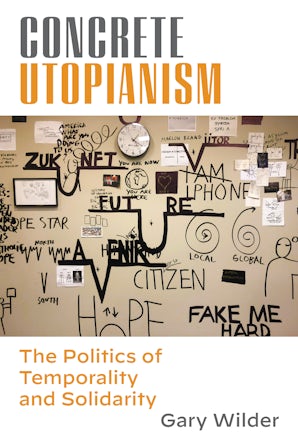
Shortlisted: Big Other Book Award for Nonfiction
Finalist, 2022 Big Other Book Award for Nonfiction
Never before has it been more important for Left thinking to champion expansive visions for societal transformation. Yet influential currents of critical theory have lost sight of this political imperative. Provincial notions of places, periods, and subjects obstruct our capacity to invent new alignments and envision a world we wish to see. Political imagination is misread as optimism. Utopianism is conflated with idealism. Revolutionary traditions of non-liberal universalism and non-bourgeois humanism are rendered illegible. Negative critique becomes an end in itself. Pessimism is mistaken for radicalism and political fatalism risks winning the day.
In this book, Gary Wilder insists that we place solidarity and temporality at the center of our political thinking. He develops a critique of Left realism, Left culturalism, and Left pessimism from the standpoint of heterodox Marxism and Black radicalism. These traditions offer precious resources to relate cultural singularity and translocal solidarity, political autonomy and worldwide interdependence. They develop modes of immanent critique and forms of poetic knowledge to envision alternative futures that may already dwell within our world: traces of past ways of being, knowing, and relating that persist within an untimely present; or charged residues of unrealized possibilities that were the focus of an earlier generation’s dreams and struggles; or opportunities for dialectical reversals embedded in the contradictory tendencies of the given order.
Concrete Utopianism makes a bold case for embracing what Wilder calls a politics of the possible-impossible. Attentive to the non-identical character of places, periods, and subjects, insisting that axes of political alignment and contestation are neither self-evident nor unchanging, reworking Lenin’s call to “transform the imperial war into a civil war,” he invites Left thinkers see beyond inherited distinctions between here and there, now and then, us and them. Guided by the spirit of Marx’s call for revolutionaries to draw their poetry from a future they cannot fathom yet must nevertheless invent, he calls for practices of anticipation that envision and enact, call for and call forth, seemingly impossible ways of being together. He elaborates a critical orientation that emphasizes the dialectical relations between aesthetics and politics, political imagination and transformative practice, concrete interventions and revolutionary restructuring, past dreams and possible worlds, means of struggle and its ultimate aims. This orientation requires nonrealist epistemologies that do not mistake immediate appearances with the really real. Such epistemologies would allow critics to recognize uncanny and untimely aspects of social life, whether oppressive or potentially emancipatory. They may help actors to render the world subversively uncanny and untimely. They may clear pathways for the kind of critical internationalism and concrete utopianism that Left politics cannot afford to ignore.
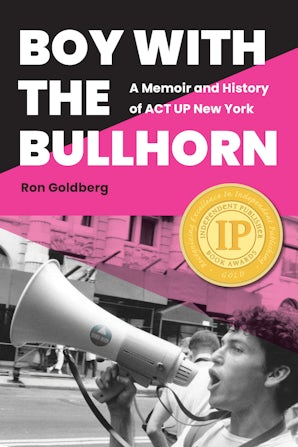
Winner: Independent Publisher Book Awards | IPPY Awards
Winner, "Gold" Independent Publishing Award (IPPY) for LGBTQ+ Nonfiction
Winner, The Randy Shilts Award for Gay Nonfiction, 34th Annual Triangle Awards
2023 Lammy Finalist, Gay Memoir/Biography
A coming-of-age memoir of life on the front lines of the AIDS crisis with ACT UP New York.
From the moment Ron Goldberg stumbled into his first ACT UP meeting in June 1987, the AIDS activist organization became his life. For the next eight years, he chaired committees, planned protests, led teach-ins, and facilitated their Monday night meetings. He cruised and celebrated at ACT UP parties, attended far too many AIDS memorials, and participated in more than a hundred zaps and demonstrations, becoming the group’s unofficial “Chant Queen,” writing and leading chants for many of their major actions. Boy with the Bullhorn is both a memoir and an immersive history of the original New York chapter of ACT UP, the AIDS Coalition to Unleash Power, from 1987 to 1995, told with great humor, heart, and insight.
Using the author’s own story, “the activist education of a well-intentioned, if somewhat naïve nice gay Jewish theater queen,” Boy with the Bullhorn intertwines Goldberg’s experiences with the larger chronological history of ACT UP, the grassroots AIDS activist organization that confronted politicians, scientists, drug companies, religious leaders, the media, and an often uncaring public to successfully change the course of the AIDS epidemic.
Diligently sourced and researched, Boy with the Bullhorn provides both an intimate look into how activist strategies are developed and deployed and a snapshot of life in New York City during the darkest days of the AIDS epidemic. On the occasions where Goldberg writes outside his personal experience, he relies on his extensive archive of original ACT UP documents, news articles, and other published material, as well as activist videos and oral histories, to help flesh out actions, events, and the background stories of key activists. Writing with great candor, Goldberg examines the group’s triumphs and failures, as well as the pressures and bad behaviors that eventually tore ACT UP apart.
A story of ordinary people doing extraordinary things, from engaging in outrageous, media-savvy demonstrations, to navigating the intricacies of drug research and the byzantine bureaucracies of the FDA, NIH, and CDC, Boy with the Bullhorn captures the passion, smarts, and evanescent spirit of ACT UP—the anger, grief, and desperation, but also the joy, camaraderie, and sexy, campy playfulness—and the exhilarating adrenaline rush of activism.

Winner: The David R. Coffin Publication Grant
Winner, The David R. Coffin Publication Grant
A vibrant exploration of the everyday life of one of the most diverse places in the world: Queens, New York.
Remade by decades of immigration, Queens, New York, has emerged as an emblematic space of social mixing and encounters across multiple lines of difference. With its expansive subdivisions, tangled highways, and centerless form, it is also New York’s most enigmatic borough. It can feel alternately like a big city, a tight-knit village, a featureless industrial zone, or a sprawling suburban community. Through more than 200 contemporary photographs, Joseph Heathcott captures this multifaceted borough and one of the most diverse places in the United States.
Drawn from more than a decade of roaming around Queens and snapping photos, Heathcott conveys the juxtaposition of the ordinary and the extraordinary, the mundane and the surprising, and the staggering social diversity that best characterizes Queens. At the heart of the story are two separate but entwined histories: the rapid expansion of the borough’s built environment through the twentieth century, and the millions of people who have traveled from near and far to call Queens home. Newcomers have had to confront discrimination, white racial hostility, legal challenges, and language barriers. They have had to struggle to find adequate housing, places to worship, and jobs that pay enough to survive. And they have done all of this in the borough’s jumbled collection of neighborhoods, housing types, civic and religious institutions, factories and warehouses, commercial streets, and strip malls.
Heathcott makes primary use of documentary photography to bring these social and spatial realities of everyday life into relief. He also draws on demographic data, archival sources, planning documents, news stories, and reports. The result is a visual meditation on Queens that provides clues about an urban future where notions of citizenship and belonging are negotiated across multiple lines of difference, but where a sense of ”getting along”—however roughly textured and unfinished—has taken hold in the everyday life of the streets.

Winner: Publishing Triangle Awards
Winner, "Gold" Independent Publishing Award (IPPY) for LGBTQ+ Nonfiction
Winner, The Randy Shilts Award for Gay Nonfiction, 34th Annual Triangle Awards
2023 Lammy Finalist, Gay Memoir/Biography
A coming-of-age memoir of life on the front lines of the AIDS crisis with ACT UP New York.
From the moment Ron Goldberg stumbled into his first ACT UP meeting in June 1987, the AIDS activist organization became his life. For the next eight years, he chaired committees, planned protests, led teach-ins, and facilitated their Monday night meetings. He cruised and celebrated at ACT UP parties, attended far too many AIDS memorials, and participated in more than a hundred zaps and demonstrations, becoming the group’s unofficial “Chant Queen,” writing and leading chants for many of their major actions. Boy with the Bullhorn is both a memoir and an immersive history of the original New York chapter of ACT UP, the AIDS Coalition to Unleash Power, from 1987 to 1995, told with great humor, heart, and insight.
Using the author’s own story, “the activist education of a well-intentioned, if somewhat naïve nice gay Jewish theater queen,” Boy with the Bullhorn intertwines Goldberg’s experiences with the larger chronological history of ACT UP, the grassroots AIDS activist organization that confronted politicians, scientists, drug companies, religious leaders, the media, and an often uncaring public to successfully change the course of the AIDS epidemic.
Diligently sourced and researched, Boy with the Bullhorn provides both an intimate look into how activist strategies are developed and deployed and a snapshot of life in New York City during the darkest days of the AIDS epidemic. On the occasions where Goldberg writes outside his personal experience, he relies on his extensive archive of original ACT UP documents, news articles, and other published material, as well as activist videos and oral histories, to help flesh out actions, events, and the background stories of key activists. Writing with great candor, Goldberg examines the group’s triumphs and failures, as well as the pressures and bad behaviors that eventually tore ACT UP apart.
A story of ordinary people doing extraordinary things, from engaging in outrageous, media-savvy demonstrations, to navigating the intricacies of drug research and the byzantine bureaucracies of the FDA, NIH, and CDC, Boy with the Bullhorn captures the passion, smarts, and evanescent spirit of ACT UP—the anger, grief, and desperation, but also the joy, camaraderie, and sexy, campy playfulness—and the exhilarating adrenaline rush of activism.
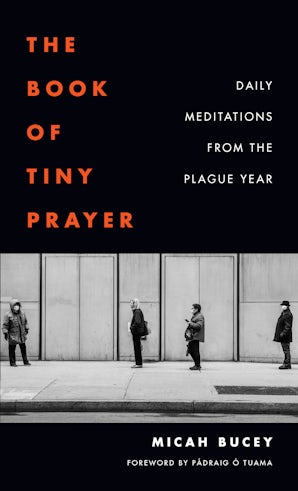
Winner: AUPresses Book, Jacket, and Journal Show, Trade Typographic
NAMED ONE OF THE BEST SPIRITUAL BOOKS OF 2021 BY SPIRITUALITY & PRACTICE
Winner, 2023 AUPresses Book, Jacket, and Journal Show, Trade Typographic
Bearing witness to the first year of the COVID-19 pandemic
When New York City went into lockdown in March 2020, spiritual leader Micah Bucey found the world and himself in desperate need of prayer. While social distancing created disconnect, Bucey began a daily practice of writing a “Tiny Prayer” each morning and posting it on social media, each offering a reflection on what was going on in his own heart and in the wider world. Soon, a solitary practice became a communal one, with others engaging and sharing the prayers that touched them most, suggesting issues and topics for future prayers, and creating connection across a digital divide.
Over the course of a year filled with fear and faith, protest and possibility, Bucey composed prayers for frontline workers and activists, those lost to illness and wins for democracy, for civic leaders, celebrities, and everyday emotions. While overwhelm threatened to engulf us all, these short meditations invited a combination of attention and intention in bite-sized form that aided the reader in focusing on one issue at a time, from the rise of infections, hospitalizations, and deaths, to police violence, social justice uprisings, immigrant detentions, catastrophic climate events, mass shootings, and violent right-wing insurrections.
Now, all 366 “Tiny Prayers” are collected here, together forming a chronicle of a specific moment in time and modeling a form for everyone to compose their own tiny prayers to engage the everyday around them. The Book of Tiny Prayer recalls a very particular year, but its spirit is universal, inviting all to quiet themselves, name the pain and the joy around them, and recommit to the change required for collective liberation, during the worst times and far beyond.
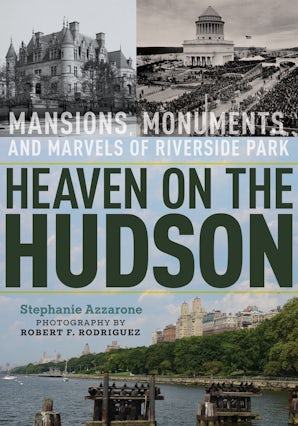
Winner: Victorian Society in America Book Award
Winner, Victorian Society in America Book Award
A colorful tale of a singular New York City neighborhood and the personalities who make it special
To outsiders or East Siders, Riverside Park and Riverside Drive may not have the star status of Fifth Avenue or Central Park West. But at the city’s westernmost edge, there is a quiet and beauty like nowhere else in all of New York. There are miles of mansions and monuments, acres of flora, and a breadth of wildlife ranging from Peregrine falcons to goats. It’s where the Gershwins and Babe Ruth once lived, William Randolph Hearst ensconced his paramour, and Amy Schumer owns a penthouse. Told in the uniquely personal voice of a longtime resident, Heaven on the Hudson is the only New York City book that features the history, architecture, and personalities of this often overlooked neighborhood, from the eighteenth century through the present day.
Combining an extensively researched history of the area and its people with an engaging one-on-one guide to its sights, author Stephanie Azzarone sheds new light on the initial development of Riverside Park and Riverside Drive, the challenges encountered—from massive boulders to “maniacs”—and the reasons why Riverside Drive never became the “new Fifth Avenue” that promoters anticipated. From grand “country seats” to squatter settlements to multi-million-dollar residences, the book follows the neighborhood’s roller-coaster highs and lows over time. Readers will discover a trove of architectural and recreational highlights and hidden gems, including the Drive’s only freestanding privately owned villa, a tomb that’s not a tomb, and a sweet memorial to an eighteenth-century child. Azzarone also tells the stories behind Riverside’s notable and forgotten residents, including celebrities, murderers, a nineteenth-century female MD who launched the country’s first anti-noise campaign, and an Irish merchant who caused a scandal by living with an Indian princess.
While much has been written about Central Park, little has focused exclusively on Riverside Drive and Riverside Park until now. Heaven on the Hudson is dedicated to sharing this West Side neighborhood’s most special secrets, the ones that, without fail, bring both pleasure and peace in a city of more than 8 million.

Shortlisted: Lambda Literary Award in Gay Memoir/Biography
Winner, "Gold" Independent Publishing Award (IPPY) for LGBTQ+ Nonfiction
Winner, The Randy Shilts Award for Gay Nonfiction, 34th Annual Triangle Awards
2023 Lammy Finalist, Gay Memoir/Biography
A coming-of-age memoir of life on the front lines of the AIDS crisis with ACT UP New York.
From the moment Ron Goldberg stumbled into his first ACT UP meeting in June 1987, the AIDS activist organization became his life. For the next eight years, he chaired committees, planned protests, led teach-ins, and facilitated their Monday night meetings. He cruised and celebrated at ACT UP parties, attended far too many AIDS memorials, and participated in more than a hundred zaps and demonstrations, becoming the group’s unofficial “Chant Queen,” writing and leading chants for many of their major actions. Boy with the Bullhorn is both a memoir and an immersive history of the original New York chapter of ACT UP, the AIDS Coalition to Unleash Power, from 1987 to 1995, told with great humor, heart, and insight.
Using the author’s own story, “the activist education of a well-intentioned, if somewhat naïve nice gay Jewish theater queen,” Boy with the Bullhorn intertwines Goldberg’s experiences with the larger chronological history of ACT UP, the grassroots AIDS activist organization that confronted politicians, scientists, drug companies, religious leaders, the media, and an often uncaring public to successfully change the course of the AIDS epidemic.
Diligently sourced and researched, Boy with the Bullhorn provides both an intimate look into how activist strategies are developed and deployed and a snapshot of life in New York City during the darkest days of the AIDS epidemic. On the occasions where Goldberg writes outside his personal experience, he relies on his extensive archive of original ACT UP documents, news articles, and other published material, as well as activist videos and oral histories, to help flesh out actions, events, and the background stories of key activists. Writing with great candor, Goldberg examines the group’s triumphs and failures, as well as the pressures and bad behaviors that eventually tore ACT UP apart.
A story of ordinary people doing extraordinary things, from engaging in outrageous, media-savvy demonstrations, to navigating the intricacies of drug research and the byzantine bureaucracies of the FDA, NIH, and CDC, Boy with the Bullhorn captures the passion, smarts, and evanescent spirit of ACT UP—the anger, grief, and desperation, but also the joy, camaraderie, and sexy, campy playfulness—and the exhilarating adrenaline rush of activism.
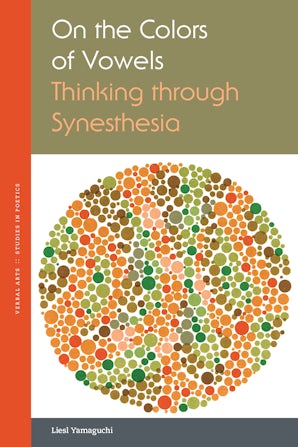
Winner: Helen Tartar First Book Subvention Prize
Treatments of synesthesia in the arts and humanities generally assume a clear distinction between the neurological condition and the literary device. Synesthetes’ descriptions of colors seen in connection with music, for example, are thought to differ fundamentally from common expressions that rely on transpositions across sensory dimensions (“bright vowels”). This has not always been the case. The distinction emerged over the course of the twentieth century, as scientists sought to constitute “synesthesia” as a legitimate object of modern science.
On the Colors of Vowels investigates the ambiguity of visual descriptions of vowels across a wide range of disciplines, casting several landmark texts in a wholly new light. The book traces the migration of sound-color correspondence from its ancient host (music) to its modern one (vowels), investigating the vocalic Klangfarben of Hermann von Helmholtz’s monumental Sensations of Tone, the vowel colors reported in early psychology surveys into audition colorée (colored hearing), the mis-matched timbres that form poetry’s condition of possibility in Stéphane Mallarmé’s “Crisis of Verse,” and the vowel-color analogy central to both the universal alphabets of the nineteenth century and the phonological universals of the twentieth. The book’s final chapter turns to an intricately detailed account of vowel-color correspondence by Ferdinand de Saussure, suggesting how the linguist’s sensitivity to vowel coloration may have guided his groundbreaking study of Indo-European vocalism.
Bringing out the diverse ways in which visual conceptions of vowels have inflected the arts and sciences of modernity, On the Colors of Vowels makes it possible to see how discourses of the nineteenth and twentieth centuries crafted the enigma we now readily recognize as “synesthesia.”
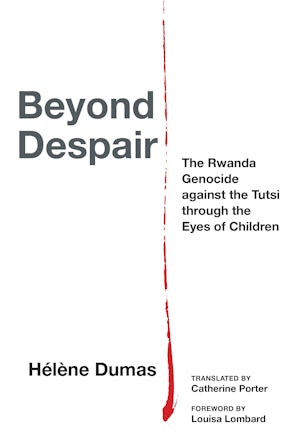
Winner: Albertine Translation Fund and Prizes
Winner, Prix Pierre Lafue
Winner, Prix lycéen du livre d’histoire des Rendez-vous de l’histoire de Blois
In the archives of the main institution in charge of the history and memory of the genocide in Rwanda, several bundles of fragile little school notebooks contain, in the silence of accumulated dust, the stories of around a hundred surviving children. Written in 2006 at the initiative of a Rwandan survivors’ association, as a testimonial and psychological catharsis, these accounts by children who have since become young men and women tell the story of their experience of the genocide, as well as of “life before” and “life after.”
The words of these children, the cruel realism of the scenes they describe, the power of the emotions they express, provide the historian with an unparalleled insight into the subjectivities of the survivors, and also enable us to take on board the murderous discourse and gestures of those who eradicated their world of childhood forever. Far from abstract postulates on the “unspeakable,” Beyond Despair offers a reflection on the conditions that make audible such an experience of dereliction in the twilight of the twentieth century.
This work received support for excellence in publication and translation from Albertine Translation, a program created by Villa Albertine and funded by FACE Foundation.

Winner: Bernard S. Cohn Book Prize
Winner, 2023 Bernard S. Cohn Prize, Association for Asian Studies
Winner, 2021 Joseph W. Elder Prize in the Indian Social Sciences
Winner, 2021 Ruth Benedict Prize, Association for Queer Anthropology
Honorable Mention, 2023 Anne Bolin & Gil Herdt Book Prize, Human Sexuality & Anthropology Interest Group
Hijras, one of India’s third gendered or trans populations, have been an enduring presence in the South Asian imagination—in myth, in ritual, and in everyday life, often associated in stigmatized forms with begging and sex work. In more recent years hijras have seen a degree of political emergence as a moral presence in Indian electoral politics, and with heightened vulnerability within global health terms as a high-risk population caught within the AIDS epidemic.
Hijras, Lovers, Brothers recounts two years living with a group of hijras in rural India. In this riveting ethnography, Vaibhav Saria reveals not just a group of stigmatized or marginalized others but a way of life composed of laughter, struggles, and desires that trouble how we read queerness, kinship, and the psyche.
Against easy framings of hijras that render them marginalized, Saria shows how hijras makes the normative Indian family possible. The book also shows that particular practices of hijras, such as refusing to use condoms or comply with retroviral regimes, reflect not ignorance, irresponsibility, or illiteracy but rather a specific idiom of erotic asceticism arising in both Hindu and Islamic traditions. This idiom suffuses the densely intertwined registers of erotics, economics, and kinship that inform the everyday lives of hijras and offer a repertoire of self-fashioning beyond the secular horizons of public health or queer theory.
Engrossingly written and full of keen insights, the book moves from the small pleasures of the everyday—laughter, flirting, teasing—to impossible longings, kinship, and economies of property and substance in order to give a fuller account of trans lives and of Indian society today.
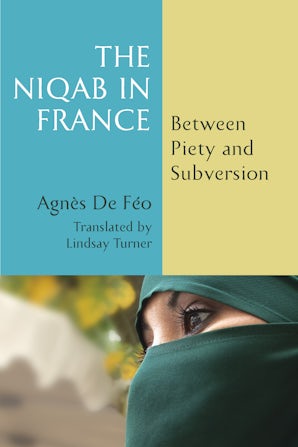
Winner: Albertine Translation Fund and Prizes
This original new work is the fascinating result of sociologist and documentary filmmaker Agnès De Féo’s ten-year exploration of the phenomenon of niqab wearing. It is at once a groundbreaking study and a series of compelling first-person accounts from French and Francophone women who wear or have worn the niqab in France’s Salafi communities. With the backdrop of the French government’s 2010 ban on full facial veiling in public spaces, which itself has shaped the phenomenon, De Féo draws on her subjects’ own words to show their agency, working against the clichés that often underlie public views of the niqab—that it is purely the result of masculine pressure, for example, or extreme religiosity or nationalism, or the submissive desire to disappear. Instead, she shows, the niqab is multivalent: women wear it for reasons that range from religious piety to the desire to rebel against mainstream society, family, or the rule of law. The reasons are complex, overdetermined, contradictory, or even inconsistent, but they are the women’s own.
Despite being worn only by a small minority of Muslim women, the Islamic garment has nonetheless been a major source of intense political, religious, and cultural debate in France. Searching to understand, rather than speculate, De Féo chose to approach the people who wear the niqab, and to make them, rather the veil itself, the subject of her research. Her unprecedented study, based on more than 200 interviews, reveals the many factors—social, political, geopolitical, and psychological—underpinning a personal choice that is not always as religious as it seems.
The book ends with sixteen captivating interviews giving voice to stories rarely heard. With finesse and discernment, the author debunks the myths surrounding the wearing of the niqab, and sheds light on a practice subject to misunderstanding and prejudice, offering the reader unique insight. Challenging our preconceived notions and stereotypes about women who wear any form of Islamic apparel, but particularly the niqab, The Niqab in France introduces a group of women each with her own life story, her own share of personal struggles, aspirations, and desires, and her own claim to a certain place in society.
This work received support for excellence in publication and translation from Albertine Translation, a program created by Villa Albertine.
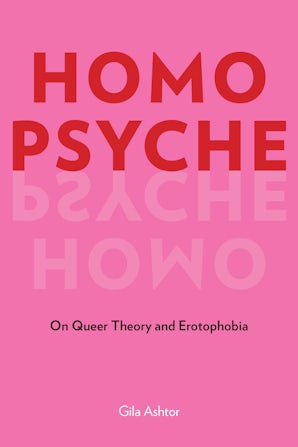
Winner: Alan Bray Memorial Book Award
Winner, Alan Bray Memorial Book Award
2022 Lammy Finalist, LGBTQ Studies
Can queer theory be erotophobic? This book proceeds from the perplexing observation that for all of its political agita, rhetorical virtuosity, and intellectual restlessness, queer theory conforms to a model of erotic life that is psychologically conservative and narrow. Even after several decades of combative, dazzling, irreverent queer critical thought, the field remains far from grasping that sexuality’s radical potential lies in its being understood as “exogenous, intersubjective and intrusive” (Laplanche). In particular, and despite the pervasiveness and popularity of recent calls to deconstruct the ideological foundations of contemporary queer thought, no study has as yet considered or in any way investigated the singular role of psychology in shaping the field’s conceptual impasses and politico-ethical limitations.
Through close readings of key thinkers in queer theoretical thought—Eve Kosofsky Sedgwick, Leo Bersani, Lee Edelman, Judith Butler, Lauren Berlant, and Jane Gallop—Homo Psyche introduces metapsychology as a new dimension of analysis vis-à-vis the theories of French psychoanalyst Jean Laplanche, who insisted on “new foundations for psychoanalysis” that radically departed from existing Freudian and Lacanian models of the mind. Staging this intervention, Ashtor deepens current debates about the future of queer studies by demonstrating how the field’s systematic neglect of metapsychology as a necessary and independent realm of ideology ultimately enforces the complicity of queer studies with psychological conventions that are fundamentally erotophobic and therefore inimical to queer theory’s radical and ethical project.
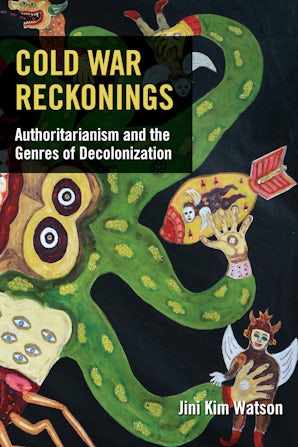
Commended: James Russell Lowell Prize
Honorable Mention, James Russell Lowell Prize, Modern Language Association
Honorable Mention, René Wellek Prize, American Comparative Literature Association
How did the Cold War shape culture and political power in decolonizing countries and give rise to authoritarian regimes in the so-called free world? Cold War Reckonings tells a new story about the Cold War and the global shift from colonialism to independent nation-states. Assembling a body of transpacific cultural works that speak to this historical conjuncture, Jini Kim Watson reveals autocracy to be not a deficient form of liberal democracy, but rather the result of Cold War entanglements with decolonization.
Focusing on East and Southeast Asia, the book scrutinizes cultural texts ranging from dissident poetry, fiction, and writers’ conference proceedings of the Cold War period, to more recent literature, graphic novels, and films that retrospectively look back to these decades with a critical eye. Paying particular attention to anti-communist repression and state infrastructures of violence, the book provides a richaccount of several U.S.–allied Cold War regimes in the Asia Pacific, including the South Korean military dictatorship, Marcos’ rule in the Philippines, illiberal Singapore under Lee Kuan Yew, and Suharto’s Indonesia.
Watson’s book argues that the cultural forms and narrative techniques that emerged from the Cold War-decolonizing matrix offer new ways of comprehending these histories and connecting them to our present. The book advances our understanding of the global reverberations of the Cold War and its enduring influence on cultural and political formations in the Asia Pacific.
Cold War Reckonings is available from the publisher on an open-access basis.

Commended: Aldo and Jeanne Scaglione Prize for Comparative Literary Studies
Honorable Mention, Aldo and Jeanne Scaglione Prize for Comparative Literary Studies, Modern Language Association
Twenty-first-century philosophy has been drawn into a false opposition between speculation and critique. Nathan Brown shows that the key to overcoming this antinomy is a re-engagement with the relation between rationalism and empiricism. If Kant’s transcendental philosophy attempted to displace the opposing priorities of those orientations, any speculative critique of Kant will have to re-open and consider anew the conflict and complementarity of reason and experience. Rationalist Empiricism shows that the capacity of reason and experience to extend and yet delimit each other has always been at the core of philosophy and science. Coordinating their discrepant powers, Brown argues, is what enables speculation to move forward in concert with critique.
Sweeping across ancient, modern, and contemporary philosophy, as well as political theory, science, and art, Brown engages with such major thinkers as Plato, Descartes, Hume, Hegel, Marx, Heidegger, Bachelard, Althusser, Badiou, and Meillassoux. He also shows how the concepts he develops illuminate recent projects in the science of measurement and experimental digital photography. With conceptual originality and argumentative precision, Rationalist Empiricism reconfigures the history and the future of philosophy, politics, and aesthetics.
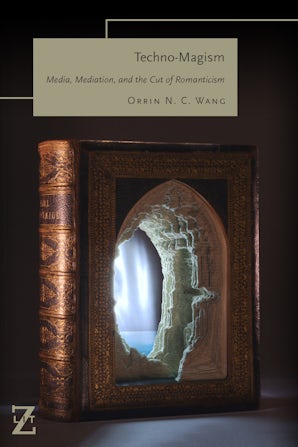
Shortlisted: Marilyn Gaull Book Award
Shortlisted, Marilyn Gaull Book Award
Techno-Magism explores how British Romantic literature abuts and is organized around both print and non-print media. The book explores not only the print, pictorial art, and theater of early nineteenth-century England and Europe but also communicative technologies invented after the British Romantic period, such as photography, film, video, and digital screens. This proleptic abutting points to one way we can understand the implicit exceptionality wagered by reading Romanticism through media studies and media theory.
Techno-Magism argues that both media studies and the concept of mediation in general can benefit from a more robust confrontation with, or recovery of, the arguments of deconstruction, an unavoidable consequence of thinking about the relationship between Romanticism and media. The book thinks that relationship through the catachrestic practice of a techno-magism, a technics of inscription always outside the causalities of a dialectical economy. The book further pursues two interrelated ideas: the structural incommensurability of the cut and the unapologetic presentism of the constellation. Marked by its late capitalist moment of composition, the book explores the continuity between the social character of Romantic and post-Romantic media, in terms of commodity culture, revolution, and the ecological devastation of the anthropocene.
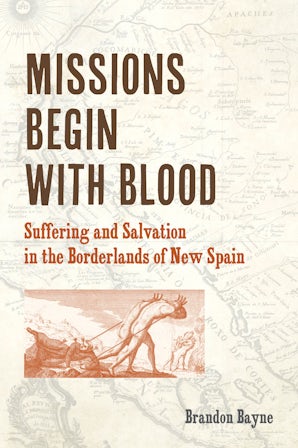
Winner: Frank S. and Elizabeth D. Brewer Prize
Winner, 2022 Frank S. and Elizabeth D. Brewer Prize
While the idea that successful missions needed Indigenous revolts and missionary deaths seems counterintuitive, this book illustrates how it became a central logic of frontier colonization in Spanish North America. Missions Begin with Blood argues that martyrdom acted as a ceremony of possession that helped Jesuits understand violence, disease, and death as ways that God inevitably worked to advance Christendom. Whether petitioning superiors for support, preparing to extirpate Native “idolatries,” or protecting their conversions from critics, Jesuits found power in their persecution and victory in their victimization. This book correlates these tales of sacrifice to deep genealogies of redemptive death in Catholic discourse and explains how martyrological idioms worked to rationalize early modern colonialism. Specifically, missionaries invoked an agricultural metaphor that reconfigured suffering into seed that, when watered by sweat and blood, would one day bring a rich harvest of Indigenous Christianity.
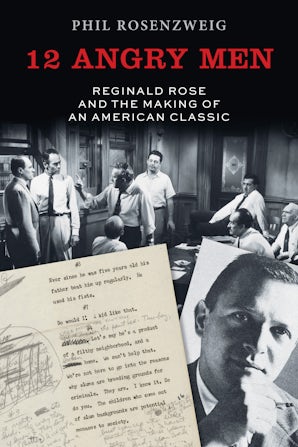
Commended: Wall Award
Reginald Rose and the Journey of 12 Angry Men
Finalist, 2021 Wall Award (Formerly the Theatre Library Association Award)
The untold story behind one of America’s greatest dramas.
In early 1957, a low-budget black-and-white movie opened across the United States. Consisting of little more than a dozen men arguing in a dingy room, it was a failure at the box office and soon faded from view.
Today, 12 Angry Men is acclaimed as a movie classic, revered by the critics, beloved by the public, and widely performed as a stage play, touching audiences around the world. It is also a favorite of the legal profession for its portrayal of ordinary citizens reaching a just verdict and widely taught for its depiction of group dynamics and human relations. Few twentieth-century American dramatic works have had the acclaim and impact of 12 Angry Men.
Rosenzweig’s 12 Angry Men tells two stories: the life of a great writer and the journey of his most famous work, one that ultimately outshined its author. More than any writer in the Golden Age of Television, Reginald Rose took up vital social issues of the day—from racial prejudice to juvenile delinquency to civil liberties—and made them accessible to a wide audience. His 1960s series, The Defenders, was the finest drama of its age and set the standard for legal dramas. This book brings Reginald Rose’s long and successful career, its origins and accomplishments, into view at long last.
By placing 12 Angry Men in its historical and social context—the rise of television, the blacklist, and the struggle for civil rights—Rosenzweig traces the story of this brilliant courtroom drama, beginning with the chance experience that inspired Rose, to its performance on CBS’s Westinghouse Studio One in 1954, to the feature film with Henry Fonda. The book describes Sidney Lumet’s casting, the sudden death of one actor, and the contribution of cinematographer Boris Kaufman. It explores various drafts of the drama, with Rose settling on the shattering climax only days before filming began.
Drawing on extensive research and brimming with insight, this book casts new light on one of America’s great dramas—and about its author, a man of immense talent and courage.
Author royalties will be donated equally to the Feerick Center for Social Justice at Fordham Law School and the Justice John Paul Stevens Jury Center at Chicago-Kent College of Law.

Winner: Vasiliki Karagiannaki Prize for the Best Edited Volume in Modern Greek Studies
Redirecting Ethnic Singularity
Winner: Vasiliki Karagiannaki Prize for the Best Edited Volume in Modern Greek Studies
Promotes the understanding of Italian Americans and Greek Americans through the study of their interactions and juxtapositions.
Redirecting Ethnic Singularity: Italian Americans and Greek Americans in Conversation contributes to U.S. ethnic and immigration studies by bringing into conversation scholars working in the fields of Italian American and Greek American studies in the United States, Europe, and Australia. The work moves beyond the “single group” approach—an approach that privileges the study of ethnic singularity––to explore instead two ethnic groups in relation to each other in the broader context of the United States. The chapters bring into focus transcultural interfaces and inquire comparatively about similarities and differences in cultural representations associated with these two groups.
This co-edited volume contributes to the fields of transcultural and comparative studies. The book is multi-disciplinary. It features scholarship from the perspectives of architecture, ethnomusicology, education, history, cultural and literary studies, and film studies, as well as whiteness studies. It examines the production of ethnicity in the context of American political culture as well as that of popular culture, including visual representations (documentary, film, TV series) and “low brow” crime fiction. It includes analysis of literature. It involves comparative work on religious architecture, transoceanic circulation of racialized categories, translocal interconnections in the formation of pan-Mediterranean identities, and the making of the immigrant past in documentaries from Italian and Greek filmmakers. This volume is the first of its kind in initiating a multidisciplinary transcultural and comparative study across European Americans.
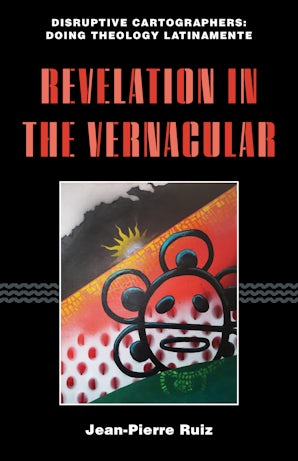
Commended: Association of Catholic Publishers 2022 Excellence in Publishing Awards: First Place, Theology Catholic Media Association, Honorable Mention in Theology: Morality, Ethics, Christology, Mariology, and Redemption
Association of Catholic Publishers 2022 Excellence in Publishing Awards: First Place, Theology
Catholic Media Association, Honorable Mention in Theology: Morality, Ethics, Christology, Mariology, and Redemption
Unveiling divine mysteries across continents and centuries.
Revelation in the Vernacular retrieves a hermeneutics of the vernacular that is rooted en lo cotidiano, in everyday life and experience. Traversing time and geography, Ruiz remaps a theology of revelation done latinamente, beginning with sixteenth-century encounters of Spanish colonizers with Indigenous peoples in the Caribbean. Drawing on the theology of the Incarnation articulated by Fray Luis de León (1527–91), he offers rich resources for interreligious engagement by believers in today’s religiously diverse world. Through an analysis of the documents of the 2019 Amazonian Synod, including Querida Amazonia, the Postsynodal Exhortation by Pope Francis, he explores a culture of encounter and dialogue that has been a hallmark of this pontificate. From the inscriptions in the caves of la Isla de Mona through the writings of the Latin American Bishops (CELAM), this book establishes a solid basis on which to discern the “Seeds of the Word” in our times.
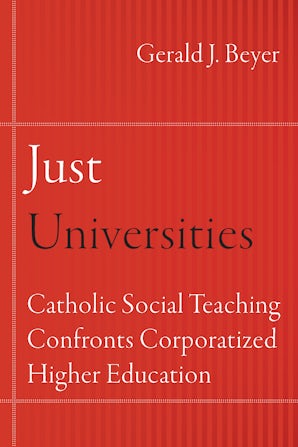
Commended: Third Place - Catholic Media Association: Catholic Social Teaching
Third Place, Catholic Media Association: Catholic Social Teaching
Gerald J. Beyer’s Just Universities discusses ways that U.S. Catholic institutions of higher education have embodied or failed to embody Catholic social teaching in their campus policies and practices. Beyer argues that the corporatization of the university has infected U.S. higher education with hyper-individualistic models and practices that hinder the ability of Catholic institutions to create an environment imbued with bedrock values and principles of Catholic Social Teaching such as respect for human rights, solidarity, and justice. Beyer problematizes corporatized higher education and shows how it has adversely affected efforts at Catholic schools to promote worker justice on campus; equitable admissions; financial aid; retention policies; diversity and inclusion policies that treat people of color, women, and LGBTQ persons as full community members; just investment; and stewardship of resources and the environment.
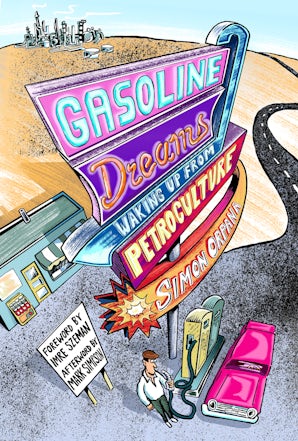
Commended: Alanna Bodnar Memorial Book Prize for the Environmental Humanities
A graphic novel that confronts our habits, narratives, and fantasies head-on to help
break our petroleum dependency
What if the biggest barriers to responding to climate change are not technological or governmental but, rather, cultural? In other words, what if we ourselves could help to enact change through a deeper understanding of our petroleum dependency? In a provocative graphic format that draws widely from history, critical theory, and popular culture, Gasoline Dreams explores and challenges the ways fossil fuels have shaped our identities, relationships, and our ability to imagine sustainable, equitable futures.
As our rapidly warming planet is pushed toward ecological collapse, we might often feel helpless or paralyzed by the enormity of the challenges confronting us. However, reflecting upon the cultural dimensions of our predicament helps reveal the great potential for social transformation inherent in the multiplying crises. Author and artist Simon Orpana engages with contemporary scholarship in the emergent field of Energy Humanities to confront the habits, narratives, and fantasies that support our attachment to fossil fuels. By revealing the many ways petroculture repeatedly fails to deliver on its promises of “the good life,” Gasoline Dreams calls us to the difficult work of waking up from the fantasies that inhibit us from working toward a global transition to renewable energy.
Written in an engaging graphic format that makes relevant historical, cultural, and political analyses of global warming and petrol dependency important to a wide audience, Gasoline Dreams refutes the progress narratives that depict contemporary, energy-intensive societies as the inevitable product of human history. By revealing the contingencies, coercions, and compulsions this myth disguises, the book allows us to imagine truly progressive alternatives. Rather than casting climate change as a problem for technological elites to solve, the book confronts the everyday realities that reinforce our dependence on fossil fuels, offering a space of hope and engagement from which concerned people can work to build a more sustainable future.
On the threshold of the single greatest transformation the human species has yet faced, Gasoline Dreams challenges us to start living, working, and dreaming differently to become less culturally dependent on petroleum.

Commended: René Wellek Prize
Honorable Mention, James Russell Lowell Prize, Modern Language Association
Honorable Mention, René Wellek Prize, American Comparative Literature Association
How did the Cold War shape culture and political power in decolonizing countries and give rise to authoritarian regimes in the so-called free world? Cold War Reckonings tells a new story about the Cold War and the global shift from colonialism to independent nation-states. Assembling a body of transpacific cultural works that speak to this historical conjuncture, Jini Kim Watson reveals autocracy to be not a deficient form of liberal democracy, but rather the result of Cold War entanglements with decolonization.
Focusing on East and Southeast Asia, the book scrutinizes cultural texts ranging from dissident poetry, fiction, and writers’ conference proceedings of the Cold War period, to more recent literature, graphic novels, and films that retrospectively look back to these decades with a critical eye. Paying particular attention to anti-communist repression and state infrastructures of violence, the book provides a richaccount of several U.S.–allied Cold War regimes in the Asia Pacific, including the South Korean military dictatorship, Marcos’ rule in the Philippines, illiberal Singapore under Lee Kuan Yew, and Suharto’s Indonesia.
Watson’s book argues that the cultural forms and narrative techniques that emerged from the Cold War-decolonizing matrix offer new ways of comprehending these histories and connecting them to our present. The book advances our understanding of the global reverberations of the Cold War and its enduring influence on cultural and political formations in the Asia Pacific.
Cold War Reckonings is available from the publisher on an open-access basis.
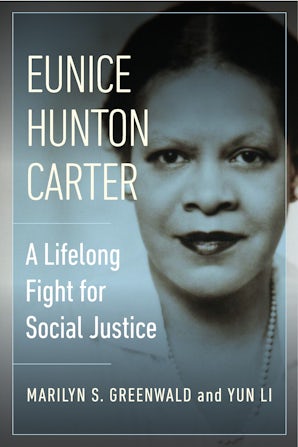
Commended: Foreword INDIES Book of the Year Awards - 2021 BRONZE Winner for Biography
2022 PROSE Awards Category Winner - Biography & Autobiography
Foreword INDIES Book of the Year Awards - 2021 BRONZE Winner for Biography
The fascinating biography of Eunice Hunton Carter, a social justice and civil rights trailblazer and the only woman prosecutor on the Luciano trial
Eunice Hunton Carter rose to public prominence in 1936 as both the only woman and the only person of color on Thomas Dewey’s famous gangbuster team that prosecuted mobster Lucky Luciano. But her life before and after the trial remains relatively unknown. In this definitive biography on this trailblazing social justice activist, authors Marilyn S. Greenwald and Yun Li tell the story of this unknown but critical pioneer in the struggle for racial and gender equality in the twentieth century.
Carter worked harder than most men because of her race and gender, and Greenwald and Li reflect on her lifelong commitment to her adopted home of Harlem, where she was viewed as a role model, arts patron, community organizer, and, later, as a legal advisor to the United Nations, the National Council of Negro Women, and several other national and global organizations.
Carter was both a witness to and a participant in many pivotal events of the early and mid– twentieth century, including the Harlem riot of 1935 and the social scene during the Harlem Renaissance.
Using transcripts, letters, and other primary and secondary sources from several archives in the United States and Canada, the authors paint a colorful portrait of how Eunice continued the legacy of the Carter family, which valued education, perseverance, and hard work: a grandfather who was a slave who bought his freedom and became a successful businessman in a small colony of former slaves in Ontario, Canada; a father who nearly single-handedly integrated the nation’s YMCAs in the Jim Crow South; and a mother who provided aid to Black soldiers in France during World War I and who became a leader in several global and domestic racial equality causes.
Carter’s inspirational multi-decade career working in an environment of bias, segregation, and patriarchy in Depression-era America helped pave the way for those who came after her.
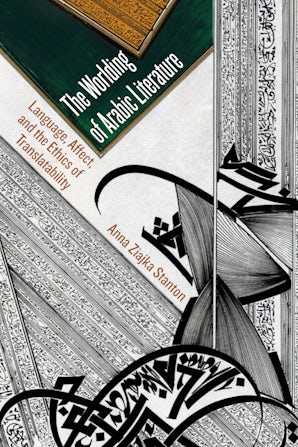
Winner: Helen Tartar First Book Subvention Prize
The Worlding of Arabic Literature
Critics have long viewed translating Arabic literature into English as an ethically fraught process of mediating between two wholly incommensurable languages, cultures, and literary traditions. Today, Arabic literature is no longer “embargoed” from Anglophone cultural spaces, as Edward Said once famously claimed that it was. As Arabic literary works are translated into English in ever-greater numbers, what alternative model of translation ethics can account for this literature’s newfound readability in the hegemonic language of the world literary system?
The Worlding of Arabic Literature argues that an ethical translation of a work of Arabic literature is one that transmits the literariness of the source text by engaging new populations of readers via a range of embodied and sensory effects. The book proposes that when translation is conceived of not as an exchange of semantic content but as a process of converting the affective forms of one language into those of another, previously unrecognized modalities of worldliness open up to the source text.
In dialogue with a rich corpus of Arabic aesthetic and linguistic theory as well as contemporary scholarship in affect theory, translation theory, postcolonial theory, and world literature studies, this book offers a timely and provocative investigation of how an important literary tradition enters the world literary system.
The Worlding of Arabic Literature: Language, Affect, and the Ethics of Translatability is available from the publisher on an open-access basis.
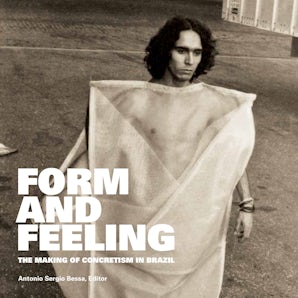
Winner: Association of University Presses Book, Jacket, and Journal Show in the Scholarly Illustrated Category
Winner, 2022 Association of University Presses Book, Jacket, and Journal Show in the Scholarly Illustrated Category
A significant contribution on the development and aftermath of post–World War II Concretism in Brazil
Form and Feeling features a collection of essays by noted scholars exploring the sensorial, experience-based, and participatory practices pioneered in the 1950s by artists and poets such as Flávio de Carvalho, Ivan Serpa, Hélio Oiticica, Haroldo de Campos, Mary Vieira, Lygia Pape, Anna Maria Maiolino, Lygia Clark, Waly Salomão, and Emil Forman, among many others. Fourteen thought-provoking essays examine how many of their strategies constituted a pertinent critique of the country’s wide-ranging embrace of Eurocentric modernity while anticipating a number of practices prevalent among contemporary artists today—namely, the rise of art as social practice, the embrace of pedagogical concerns by artists, and relational aesthetics.
The fourteen essays collected in this volume consider the ramifications of modernist abstraction in the second half of the twentieth century and contribute to a growing academic field in postwar Brazilian and Latin American art history. Contributions to this anthology examine the development of modernist ideas that flourished in Brazil during a controversial period interspersed by dictatorial regimes. The global aspect of Brazilian art is especially evident in these studies, presenting the relational complexity of their subjects as transcultural, transnational actors while simultaneously contributing to a growing, increasingly nuanced understanding of visual and material culture, performance, and criticism in Brazil.
Form and Feeling continues the important process of re-analyzing the intersections of Concretism and Neo concretism, arguing for greater affinities between the primary and lesser-known cast of characters while equally redistributing the strict geographical divisions of São Paulo and Rio de Janeiro. This anthology broadly situates this extraordinary period of artistic experimentation in direct relationship to contemporary factors, such as psychoanalysis, educational systems, poetry, politics, and feminism. It crafts innovative relationships about the constructive hierarchies of form and space, poetry and painting, and mathematics and philosophy, thus engendering new positions for a deeply ensconced period in Brazilian history.

Winner: Association of Catholic Publishers 2022 Excellence in Publishing Awards: First Place, Theology
Association of Catholic Publishers 2022 Excellence in Publishing Awards: First Place, Theology
Catholic Media Association, Honorable Mention in Theology: Morality, Ethics, Christology, Mariology, and Redemption
Unveiling divine mysteries across continents and centuries.
Revelation in the Vernacular retrieves a hermeneutics of the vernacular that is rooted en lo cotidiano, in everyday life and experience. Traversing time and geography, Ruiz remaps a theology of revelation done latinamente, beginning with sixteenth-century encounters of Spanish colonizers with Indigenous peoples in the Caribbean. Drawing on the theology of the Incarnation articulated by Fray Luis de León (1527–91), he offers rich resources for interreligious engagement by believers in today’s religiously diverse world. Through an analysis of the documents of the 2019 Amazonian Synod, including Querida Amazonia, the Postsynodal Exhortation by Pope Francis, he explores a culture of encounter and dialogue that has been a hallmark of this pontificate. From the inscriptions in the caves of la Isla de Mona through the writings of the Latin American Bishops (CELAM), this book establishes a solid basis on which to discern the “Seeds of the Word” in our times.

Shortlisted: Lambda Literary Award in LGBT Studies
Winner, Alan Bray Memorial Book Award
2022 Lammy Finalist, LGBTQ Studies
Can queer theory be erotophobic? This book proceeds from the perplexing observation that for all of its political agita, rhetorical virtuosity, and intellectual restlessness, queer theory conforms to a model of erotic life that is psychologically conservative and narrow. Even after several decades of combative, dazzling, irreverent queer critical thought, the field remains far from grasping that sexuality’s radical potential lies in its being understood as “exogenous, intersubjective and intrusive” (Laplanche). In particular, and despite the pervasiveness and popularity of recent calls to deconstruct the ideological foundations of contemporary queer thought, no study has as yet considered or in any way investigated the singular role of psychology in shaping the field’s conceptual impasses and politico-ethical limitations.
Through close readings of key thinkers in queer theoretical thought—Eve Kosofsky Sedgwick, Leo Bersani, Lee Edelman, Judith Butler, Lauren Berlant, and Jane Gallop—Homo Psyche introduces metapsychology as a new dimension of analysis vis-à-vis the theories of French psychoanalyst Jean Laplanche, who insisted on “new foundations for psychoanalysis” that radically departed from existing Freudian and Lacanian models of the mind. Staging this intervention, Ashtor deepens current debates about the future of queer studies by demonstrating how the field’s systematic neglect of metapsychology as a necessary and independent realm of ideology ultimately enforces the complicity of queer studies with psychological conventions that are fundamentally erotophobic and therefore inimical to queer theory’s radical and ethical project.

Shortlisted: The French-American Foundation Translation Prize
Finalist, French-American Foundation Translation Prize
In an age that prizes political and personal transparency, In Defense of Secrets champions the secret as what permits relation and ensures our humanity.
Psychoanalyst and philosopher Anne Dufourmantelle drowned in 2017 in an attempt to rescue two children caught in the ocean. Her work lives on, though, in this provocative and necessary book. Through etymologies and case studies, personal history and incisive commentary on contemporary society, In Defense of Secrets returns us to the fundamental psychic scene of the secret. The secret, for Dufourmantelle, is not a code to be cracked or a firewall to be penetrated but a dynamic and powerful entity that permits relation and that ensures our humanity.
Tracking the secret though art and literature, philosophy, psychoanalysis, and sociology, from the Inquisition to the present, Dufourmantelle’s writing spirals around the question of the secret’s value. In our age, when political and personal transparency seem to be prized above all—lives posted on the Internet, information leaked, whistles blown, taboos absent except with respect to the secret itself—In Defense of Secrets champions what remains hidden, private, veiled, hushed, just out of sight. The secret is on the side of nature, not science; organic growth, not technology; love’s generosity, not knowledge’s grasp.
For Dufourmantelle, the secret is a powerful and dynamic thing: deadly if unheard or misused, perhaps, but equally the source of creativity and of ethics. An ethics of the secret, we can hear her say, means listening hard and sensitively, respecting the secret in its secret essence, unafraid of it and open to what it has to say.
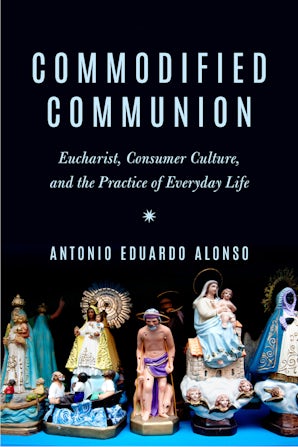
Winner: HTI Book Prize
WINNER, 2021 HTI BOOK PRIZE
Resist! This exhortation animates a remarkable range of theological reflection on consumer culture in the United States. And for many theologians, the source and summit of Christian cultural resistance is the Eucharist. In Commodified Communion, Antonio Eduardo Alonso calls into question this dominant mode of theological reflection on contemporary consumerism. Reducing the work of theology to resistance and centering Christian hope in a Eucharist that might better support it, he argues, undermines our ability to talk about the activity of God within a consumer culture. By reframing the question in terms of God’s activity in and in spite of consumer culture, this book offers a lived theological account of consumer culture that recognizes not only its deceptions but also traces of truth in its broken promises and fallen hopes.

Shortlisted: Bram Stoker Awards
Finalist, 2021 Bram Stoker Awards (Superior Achievement in Non-Fiction)
The first collection of essays to address Satan’s ubiquitous and popular appearances in film
Lucifer and cinema have been intertwined since the origins of the medium. As humankind’s greatest antagonist and the incarnation of pure evil, the cinematic devil embodies our own culturally specific anxieties and desires, reflecting moviegoers’ collective conceptions of good and evil, right and wrong, sin and salvation. Giving the Devil His Due is the first book of its kind to examine the history and significance of Satan onscreen.
This collection explores how the devil is not just one monster among many, nor is he the “prince of darkness” merely because he has repeatedly flickered across cinema screens in darkened rooms since the origins of the medium. Satan is instead a force active in our lives. Films featuring the devil, therefore, are not just flights of fancy but narratives, sometimes reinforcing, sometimes calling into question, a familiar belief system.
From the inception of motion pictures in the 1890s and continuing into the twenty-first century, these essays examine what cinematic representations tell us about the art of filmmaking, the desires of the film-going public, what the cultural moments of the films reflect, and the reciprocal influence they exert. Loosely organized chronologically by film, though some chapters address more than one film, this collection studies such classic movies as Faust, Rosemary’s Baby, The Omen, Angel Heart, The Witch, and The Last Temptation of Christ, as well as the appearance of the Devil in Disney animation.
Guiding the contributions to this volume is the overarching idea that cinematic representations of Satan reflect not only the hypnotic powers of cinema to explore and depict the fantastic but also shifting social anxieties and desires that concern human morality and our place in the universe.
Contributors: Simon Bacon, Katherine A. Fowkes, Regina Hansen, David Hauka, Russ Hunter, Barry C. Knowlton, Eloise R. Knowlton, Murray Leeder, Catherine O’Brien, R. Barton Palmer, Carl H. Sederholm, David Sterritt, J. P. Telotte, Jeffrey Andrew Weinstock

Winner: PROSE Awards Category Winner - Biography & Autobiography
2022 PROSE Awards Category Winner - Biography & Autobiography
Foreword INDIES Book of the Year Awards - 2021 BRONZE Winner for Biography
The fascinating biography of Eunice Hunton Carter, a social justice and civil rights trailblazer and the only woman prosecutor on the Luciano trial
Eunice Hunton Carter rose to public prominence in 1936 as both the only woman and the only person of color on Thomas Dewey’s famous gangbuster team that prosecuted mobster Lucky Luciano. But her life before and after the trial remains relatively unknown. In this definitive biography on this trailblazing social justice activist, authors Marilyn S. Greenwald and Yun Li tell the story of this unknown but critical pioneer in the struggle for racial and gender equality in the twentieth century.
Carter worked harder than most men because of her race and gender, and Greenwald and Li reflect on her lifelong commitment to her adopted home of Harlem, where she was viewed as a role model, arts patron, community organizer, and, later, as a legal advisor to the United Nations, the National Council of Negro Women, and several other national and global organizations.
Carter was both a witness to and a participant in many pivotal events of the early and mid– twentieth century, including the Harlem riot of 1935 and the social scene during the Harlem Renaissance.
Using transcripts, letters, and other primary and secondary sources from several archives in the United States and Canada, the authors paint a colorful portrait of how Eunice continued the legacy of the Carter family, which valued education, perseverance, and hard work: a grandfather who was a slave who bought his freedom and became a successful businessman in a small colony of former slaves in Ontario, Canada; a father who nearly single-handedly integrated the nation’s YMCAs in the Jim Crow South; and a mother who provided aid to Black soldiers in France during World War I and who became a leader in several global and domestic racial equality causes.
Carter’s inspirational multi-decade career working in an environment of bias, segregation, and patriarchy in Depression-era America helped pave the way for those who came after her.
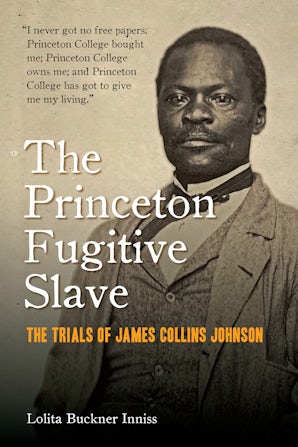
Winner: New Jersey Studies Academic Alliance Authors' Awards Program
WINNER, NEW JERSEY STUDIES ACADEMIC ALLIANCE BOOK AWARD
James Collins Johnson made his name by escaping slavery in Maryland and fleeing to Princeton, New Jersey, where he built a life in a bustling community of African Americans working at what is now Princeton University. After only four years, he was recognized by a student from Maryland, arrested, and subjected to a trial for extradition under the 1793 Fugitive Slave Act. On the eve of his rendition, after attempts to free Johnson by force had failed, a local aristocratic white woman purchased Johnson’s freedom, allowing him to avoid re-enslavement. The Princeton Fugitive Slave reconstructs James Collins Johnson’s life, from birth and enslaved life in Maryland to his daring escape, sensational trial for re-enslavement, and last-minute change of fortune, and through to the end of his life in Princeton, where he remained a figure of local fascination.
Stories of Johnson’s life in Princeton often describe him as a contented, jovial soul, beloved on campus and memorialized on his gravestone as “The Students Friend.” But these familiar accounts come from student writings and sentimental recollections in alumni reports—stories from elite, predominantly white, often southern sources whose relationships with Johnson were hopelessly distorted by differences in race and social standing. In interrogating these stories against archival records, newspaper accounts, courtroom narratives, photographs, and family histories, author Lolita Buckner Inniss builds a picture of Johnson on his own terms, piecing together the sparse evidence and disaggregating him from the other black vendors with whom he was sometimes confused.
By telling Johnson’s story and examining the relationship between antebellum Princeton’s black residents and the economic engine that supported their community, the book questions the distinction between employment and servitude that shrinks and threatens to disappear when an individual’s freedom is circumscribed by immobility, lack of opportunity, and contingency on local interpretations of a hotly contested body of law.

Winner: Ruth Benedict Book Prize
Winner, 2023 Bernard S. Cohn Prize, Association for Asian Studies
Winner, 2021 Joseph W. Elder Prize in the Indian Social Sciences
Winner, 2021 Ruth Benedict Prize, Association for Queer Anthropology
Honorable Mention, 2023 Anne Bolin & Gil Herdt Book Prize, Human Sexuality & Anthropology Interest Group
Hijras, one of India’s third gendered or trans populations, have been an enduring presence in the South Asian imagination—in myth, in ritual, and in everyday life, often associated in stigmatized forms with begging and sex work. In more recent years hijras have seen a degree of political emergence as a moral presence in Indian electoral politics, and with heightened vulnerability within global health terms as a high-risk population caught within the AIDS epidemic.
Hijras, Lovers, Brothers recounts two years living with a group of hijras in rural India. In this riveting ethnography, Vaibhav Saria reveals not just a group of stigmatized or marginalized others but a way of life composed of laughter, struggles, and desires that trouble how we read queerness, kinship, and the psyche.
Against easy framings of hijras that render them marginalized, Saria shows how hijras makes the normative Indian family possible. The book also shows that particular practices of hijras, such as refusing to use condoms or comply with retroviral regimes, reflect not ignorance, irresponsibility, or illiteracy but rather a specific idiom of erotic asceticism arising in both Hindu and Islamic traditions. This idiom suffuses the densely intertwined registers of erotics, economics, and kinship that inform the everyday lives of hijras and offer a repertoire of self-fashioning beyond the secular horizons of public health or queer theory.
Engrossingly written and full of keen insights, the book moves from the small pleasures of the everyday—laughter, flirting, teasing—to impossible longings, kinship, and economies of property and substance in order to give a fuller account of trans lives and of Indian society today.

Winner: Winner of the French Voices Translation Award
Winner, French Voices Award
This book, a crossover hit in France, offers a fresh genealogy of our neoliberal moment.
“We must adapt!” These words can be heard almost everywhere and in every aspect of our lives. Where does this widespread sense that we have fallen behind come from? How can we explain this progressive colonization of the economic, social, and political fields by this biological vocabulary of evolution? Offering a lucid account of sophisticated material, Barbara Stiegler uncovers the prehistories of today’s ubiquitous rhetoric in Darwinism and American liberalism, while, at the same time, recovering powerful resistances to the rhetoric of adaptation across the twentieth century.
Walter Lippmann, an American theorist of this new liberalism, believed democracy was not adapted to the needs of globalization. Only a government of experts could force society to evolve, he argued. Lippmann thus found himself confronted with John Dewey, the great figure of American Pragmatism. Both Lippmann and Dewey labored under the impression that the world had changed and society needed to adapt. However, Lippmann did not trust society to adapt on its own and insisted on the need for experts who would force the necessary adaptation. Dewey, by contrast, believed the necessary adaptation could only come "from below" and should proceed in a democratic fashion.
Focusing on readings of Michel Foucault, Walter Lippmann, and John Dewey, Adapt! paves the way for renewed insights into neoliberalism’s history, essence, characteristic forces, and impacts, as well as biopolitical theory. Stiegler presents an intriguing new genealogy for the development of neoliberalism, examining whether humans are by nature lagging and require biopolitical and disciplinary management to enforce adaptation. Stiegler also reorients Foucault’s genealogy of neoliberalism by emphasizing the Darwinian rhetoric of adaptation, as it arose in the Lippmann–Dewey Debate, and deftly handles the question of human nature in a way that re-enlivens this traditional concept.
As the industrialization of our ways of life never stops destroying the environment and the health of organisms (climate disruption, the destruction of biodiversity, the growth of chronic diseases, the return of large pandemics), how can we think of a democratic government of life and the living? This is the question that Stiegler’s work helps us to confront.

Winner: Winner of the French Voices Translation Award
Winner, Prix Littéraire Paris-Liège 2021
Winner, French Voices Award for Excellence in Publication and Translation
When we speak of mass killers, we may speak of radicalized ideologues, mediocrities who only obey orders, or bloodthirsty monsters. Who are these men who kill on a mass scale? What is their consciousness? Do they not feel horror or compassion?
Richard Rechtman’s Living in Death offers new answers to a question that has haunted us at least since the Holocaust. For Rechtman, it is not ideologies that kill, but people. This book descends into the ordinary life of people who execute hundreds every day, the same way others go to the office. Bringing philosophical sophistication to the ordinary, the book constitutes an anthropology of mass killers.
Turning away from existing psychological and philosophical accounts of genocide’s perpetrators, Rechtman instead explores the conditions under which administering death becomes a job like any other. Considering Cambodia, Rwanda, and other mass killings, Living in Death draws on a vast array of archival research, psychological theory, and anecdotes from the author’s clinical work with refugees and former participants in genocide. Rechtman mounts a compelling case for reframing and refocusing our attempts to explain—and preempt—acts of mass torture, rape, killing, and extermination.
What we must see, Rechtman argues, is that for genocidaires (those who carry out acts that are or approach genocide), there is nothing extraordinary, unusual, or world-historical about their actions. On the contrary, they are preoccupied with the same mundane things that characterize any other job: interactions with colleagues, living conditions, a drink and a laugh at the end of the day. To understand this is to understand how things came to be the way they are—and how they might be different.

Winner: Joseph W. Elder Prize in the Indian Social Sciences
Winner, 2023 Bernard S. Cohn Prize, Association for Asian Studies
Winner, 2021 Joseph W. Elder Prize in the Indian Social Sciences
Winner, 2021 Ruth Benedict Prize, Association for Queer Anthropology
Honorable Mention, 2023 Anne Bolin & Gil Herdt Book Prize, Human Sexuality & Anthropology Interest Group
Hijras, one of India’s third gendered or trans populations, have been an enduring presence in the South Asian imagination—in myth, in ritual, and in everyday life, often associated in stigmatized forms with begging and sex work. In more recent years hijras have seen a degree of political emergence as a moral presence in Indian electoral politics, and with heightened vulnerability within global health terms as a high-risk population caught within the AIDS epidemic.
Hijras, Lovers, Brothers recounts two years living with a group of hijras in rural India. In this riveting ethnography, Vaibhav Saria reveals not just a group of stigmatized or marginalized others but a way of life composed of laughter, struggles, and desires that trouble how we read queerness, kinship, and the psyche.
Against easy framings of hijras that render them marginalized, Saria shows how hijras makes the normative Indian family possible. The book also shows that particular practices of hijras, such as refusing to use condoms or comply with retroviral regimes, reflect not ignorance, irresponsibility, or illiteracy but rather a specific idiom of erotic asceticism arising in both Hindu and Islamic traditions. This idiom suffuses the densely intertwined registers of erotics, economics, and kinship that inform the everyday lives of hijras and offer a repertoire of self-fashioning beyond the secular horizons of public health or queer theory.
Engrossingly written and full of keen insights, the book moves from the small pleasures of the everyday—laughter, flirting, teasing—to impossible longings, kinship, and economies of property and substance in order to give a fuller account of trans lives and of Indian society today.

Commended: Choice: Outstanding Academic Title
WINNER, NEW JERSEY STUDIES ACADEMIC ALLIANCE BOOK AWARD
James Collins Johnson made his name by escaping slavery in Maryland and fleeing to Princeton, New Jersey, where he built a life in a bustling community of African Americans working at what is now Princeton University. After only four years, he was recognized by a student from Maryland, arrested, and subjected to a trial for extradition under the 1793 Fugitive Slave Act. On the eve of his rendition, after attempts to free Johnson by force had failed, a local aristocratic white woman purchased Johnson’s freedom, allowing him to avoid re-enslavement. The Princeton Fugitive Slave reconstructs James Collins Johnson’s life, from birth and enslaved life in Maryland to his daring escape, sensational trial for re-enslavement, and last-minute change of fortune, and through to the end of his life in Princeton, where he remained a figure of local fascination.
Stories of Johnson’s life in Princeton often describe him as a contented, jovial soul, beloved on campus and memorialized on his gravestone as “The Students Friend.” But these familiar accounts come from student writings and sentimental recollections in alumni reports—stories from elite, predominantly white, often southern sources whose relationships with Johnson were hopelessly distorted by differences in race and social standing. In interrogating these stories against archival records, newspaper accounts, courtroom narratives, photographs, and family histories, author Lolita Buckner Inniss builds a picture of Johnson on his own terms, piecing together the sparse evidence and disaggregating him from the other black vendors with whom he was sometimes confused.
By telling Johnson’s story and examining the relationship between antebellum Princeton’s black residents and the economic engine that supported their community, the book questions the distinction between employment and servitude that shrinks and threatens to disappear when an individual’s freedom is circumscribed by immobility, lack of opportunity, and contingency on local interpretations of a hotly contested body of law.
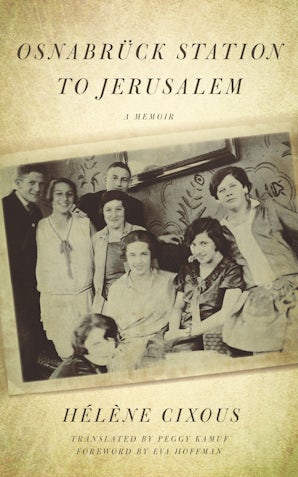
Winner: The French-American Foundation Translation Prize
Osnabrück Station to Jerusalem
An inventive literary account of Cixous’s remarkable journey to her mother’s birthplace
Winner, French Voices Award for Excellence in Publication and Translation
For about eighty years, the Jonas family of Osnabrück were part of a small but vibrant Jewish community in this mid-size city of Lower Saxony. After the war, Osnabrück counted not a single Jew. Most had been deported and murdered in the camps, others emigrated if they could and if they managed to overcome their own inertia. It is this inertia and failure to escape that Hélène Cixous seeks to account for in Osnabrück Station to Jerusalem.
Vicious anti-Semitism hounded all of Osnabrück’s Jews long before the Nazis’ rise to power in 1933. So why did people wait to leave when the threat was so patent, so in-their-face? Drawn from the stories told to Cixous by her mother, Ève, and grandmother, Rosalie (Rosi), this literary work reimagines fragments of Ève’s and Rosi’s stories, including the death of Ève’s uncle, Onkel André. Piecing together the story of Andreas Jonas from what she was told and from what she envisages, Cixous recounts the tragedy of the one she calls the King Lear of Osnabrück, who followed his daughter to Jerusalem only to be sent away by her and to return to Osnabrück in time to be deported to a death camp.
Cixous wanders the streets of the city she had heard about all her life in her mother’s and grandmother’s stories, digs into its archives, meets city officials, all the while wondering if she should have come. These hesitations and reflections in the present, often voiced in dialogues staged with her own son or daughter, are woven with scenes from her childhood in Algeria and the half-remembered, half-invented stories of the Jonas family, making Osnabrück Station to Jerusalem one of the author’s most intensely engaging books.
This work received the French Voices Award for excellence in publication and translation. French Voices is a program created and funded by the French Embassy in the United States and FACE (French American Cultural Exchange).
